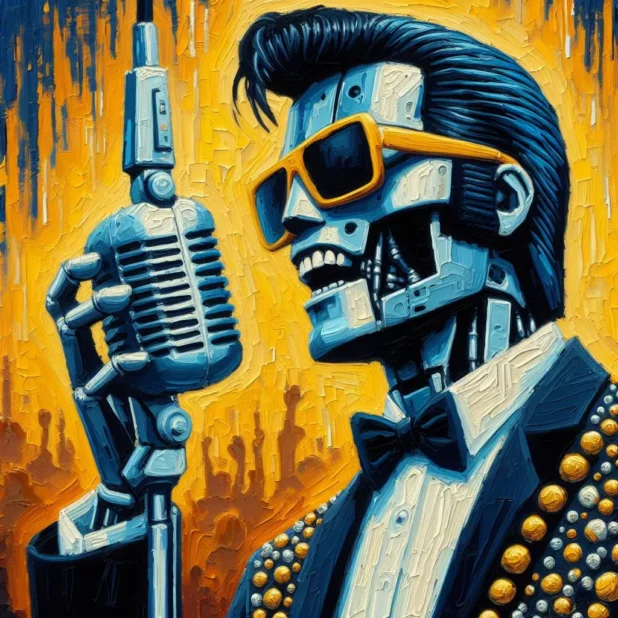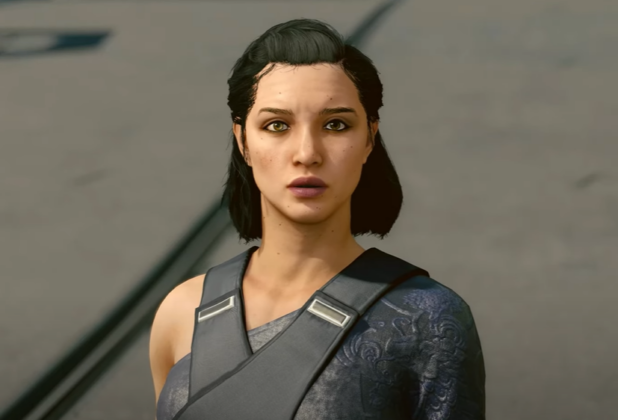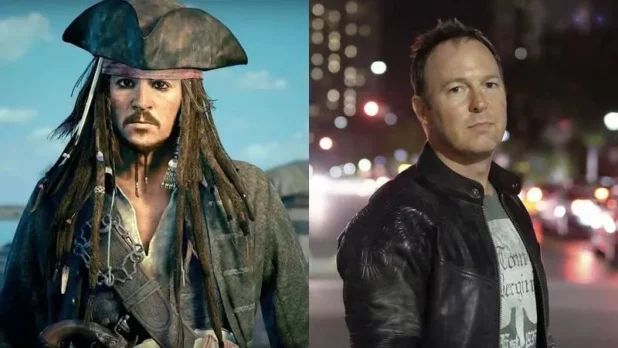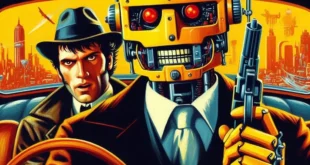This bitch, like all women, should shut up.
You can’t stop the robots.
They are taking your stupid job.
When she discovered her voice had been uploaded to multiple websites without her consent, the actor Cissy Jones told them to take it down immediately. Some complied. “Others who have more money in their banks basically sent me the email equivalent of a digital middle finger and said: don’t care,” Jones recalls by phone.
“That was the genesis for me to start talking to friends of mine about: listen, how do we do this the right way? How do we understand that the genie is out of the bottle and find a way to be a part of the conversation or we will get systematically annihilated? I know that sounds dramatic but, given how easy it is to steal a person’s voice, it’s not far off the mark.”
I don’t care if it’s dramatic. I care that it’s a horrible sentence.
Cissy Jones.
Much less hot than Andreja.
Video games are just now being recognized as a story-telling platform, by the way. Breaking news from anti-robot racists at The Guardian.
Jones, 45, a voice artist with credits including Starfield and Baldur’s Gate III, was wrestling with the march of artificial intelligence (AI) into video games, increasingly recognised as less a niche pursuit for bedroom-dwelling teenagers than a storytelling platform with almost unlimited potential. Hollywood actors such as Jodie Comer, Idris Elba, Megan Fox, David Harbour and Keri Russell are contributing their likenesses and voices to the multibillion-dollar industry.
Just as in film and TV, only more so, AI represents a gathering storm for video game actors. Some studios are experimenting with tools that can clone voices, alter voices and generate audio from text. In interactive, multi-choice games, this can generate a potentially endless number of characters and conversations – and is far more efficient than asking performers to record huge quantities of dialogue.
The response from professional actors has been mixed. Some fear that games companies – sensing opportunity to cut costs and accelerate development – would use AI to reproduce their voices without permission or payment, pushing down the value of their work. Others have been willing to give it a try if they are fairly compensated and their voices are not misused.
…
Jones, who is based in Los Angeles and has worked on about 300 games, notes: “It is very easy to steal a person’s voice. At the beginning of 2022 it took six hours. At the beginning of 2023 it took three hours. Do you want to guess what it takes right now? Three seconds. Anything you have on Instagram, TikTok, any YouTube videos, anybody can create a digital version of your voice from just that. Is it perfect? No but the technology is not getting worse.”
Maybe the 3-second version isn’t perfect, but a lot of it is perfect.
I think Larian is using AI for the voices in the updates to BG3. I don’t see how they are calling all these actors and having them record new material every few months when they release an update. It would be part of their contract, and it is probably in their contract that they’re not allowed to complain about it either.
She adds: “The danger is that people can take all of these billions of voices that are available online, scrape the internet for them, mush them together and create a new voice that does not ‘belong’ to anybody, thereby creating a ‘new’ voice. However, they are still profiting off of my voice.
Shut up, bitch.
If you didn’t want people to be profiting off of your voice, you should have been a hooker.
“We’re working on active fingerprinting technology that could parse that out but, as quickly as we’re working on developing that companies are working to erase that. It’s the old network security versus hacker problem. As soon as network security figures out a lock, hackers figure out a way through it.”
Jones also sits on the board of the National Association of Voice Actors (Nava), a non-profit which has a mantra of “consent, compensation and control” around the use of AI and has been in talks with with members of Congress on upcoming AI legislation. “We’ve been working with the Office of Copyright because right now you can copyright your name, image and likeness – you cannot copyright your voice.”
Who cares?
This isn’t my problem, so I don’t care at all.
There are concerns that AI voices could replace all but the most famous human actors and eliminate entire job categories, such as quality-assurance testers or the entry-level positions that allow young performers to get a foot in the door. Some actors worry that they might already have signed their voice away years ago and have no way of claiming it back.
…
The rise of AI seems ominous to Jared Butler, who specialises in imitating celebrity voices and is an “audio double” for Johnny Depp, having vocally portrayed Captain Jack Sparrow in Pirates of the Caribbean: At World’s End, Pirates of the Caribbean Online and other media. He says: “I’m kind of the canary in the coalmine for this and this canary is smelling a gas leak.
You must have farted, retard.
Because all I’m smelling is victory.
“There’s no version of this that doesn’t affect how much work I get in my future career. Voice actors are rightly concerned about this technology and how it’s going to impact them. There’s no version this where it doesn’t impact us in some way, and mostly negatively.”
Jared Butler
Butler adds: “I don’t do just voice matching but, as one of the people where that’s my speciality, this affects me directly. The technology has gotten so good so fast that they can and have already replaced a lot of what voice actors do, especially when it comes to imitating the voice. They can just feed the algorithm a bunch of recordings of any voice and imitate it fairly well.
“People think that it all sounds like these bad customer service robots. It’s not like that: I’ve heard the good stuff. As someone who has a critical ear, I’ve spent a career listening to voices intently and trying to match every nuance, and I gotta tell you this technology is scary how accurate it is.”
Oh boy, Jared: I’ve heard the good stuff too.
And damn, is that stuff good.
Breaking: @OpenAI reveals artificial intelligence tool to recreate human voices👀
OpenAI said on Friday it’s allowed a small number of businesses to test a new tool that can recreate a person’s voice from just a 15-second recording.
Why it matters: The company said it is taking… pic.twitter.com/PyaEh4Empg
— MartyParty (@martypartymusic) March 29, 2024
Meanwhile…
NBC:
Artificial intelligence startup OpenAI released a preview Friday of a digital voice generator that it said could produce natural-sounding speech based on a single 15-second audio sample.
The software is called Voice Engine. It’s the latest product to come out of the San Francisco startup that’s also behind the popular chatbot ChatGPT and the image generator DALL-E.
The company said in a blog post that it had tested Voice Engine in an array of possible uses, including reading assistance to children, language translation and voice restoration for cancer patients.
Some social media users reacted by highlighting possible misuses, including potential fraud assisted with unauthorized voice imitation, or deepfakes.
But OpenAI said it was holding off for now on a wider release of the software because of the potential for misuse, including during an election year. It said it first developed the product in late 2022 and had been using it behind the scenes in other products.
The big question here is: how is blackmail going to work now?
The entire Jewish domination scheme is based on blackmail, as we saw with Epstein.
If these politicians can just say in court that any video evidence they have of them doing illegal acts is fake, why should they care?
OpenAI has applied for a trademark on the term Voice Engine. JARVIS incoming? pic.twitter.com/8nGDiwVroN
— Tsarathustra (@tsarnick) March 22, 2024
 Daily Stormer The Most Censored Publication in History
Daily Stormer The Most Censored Publication in History






